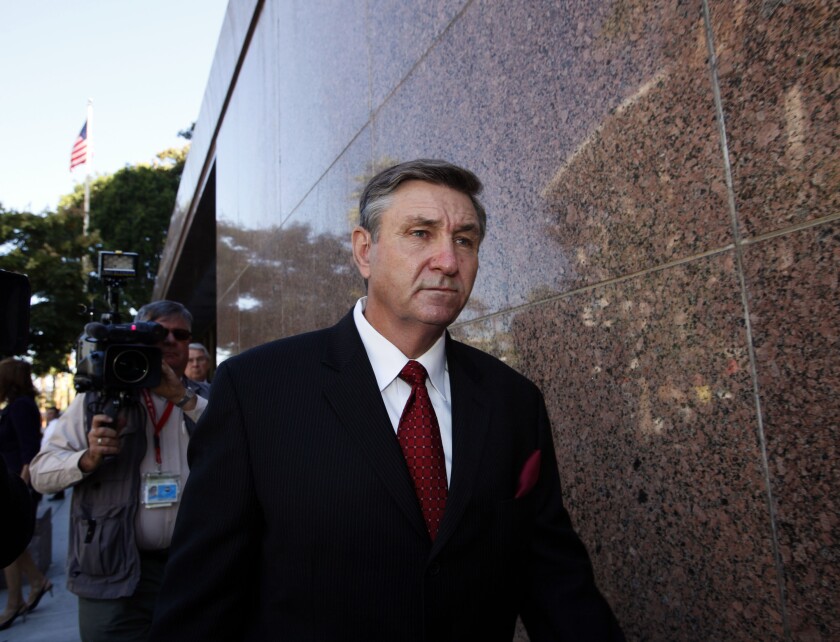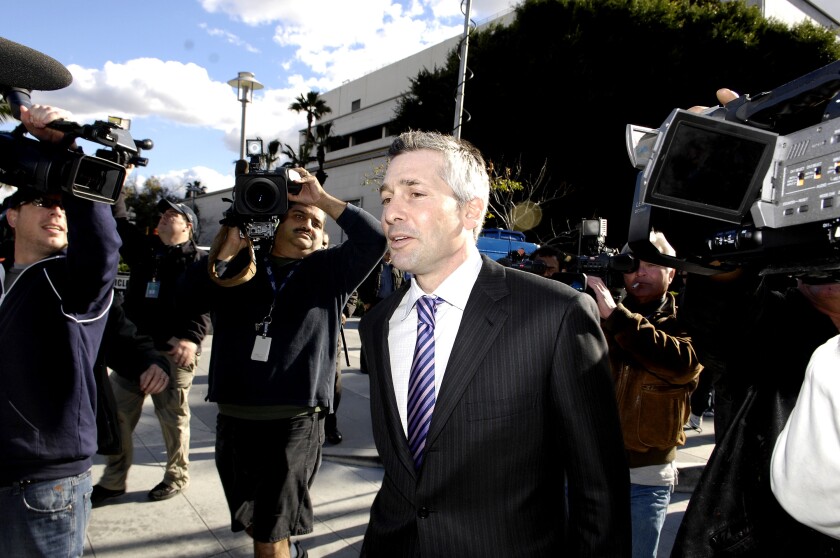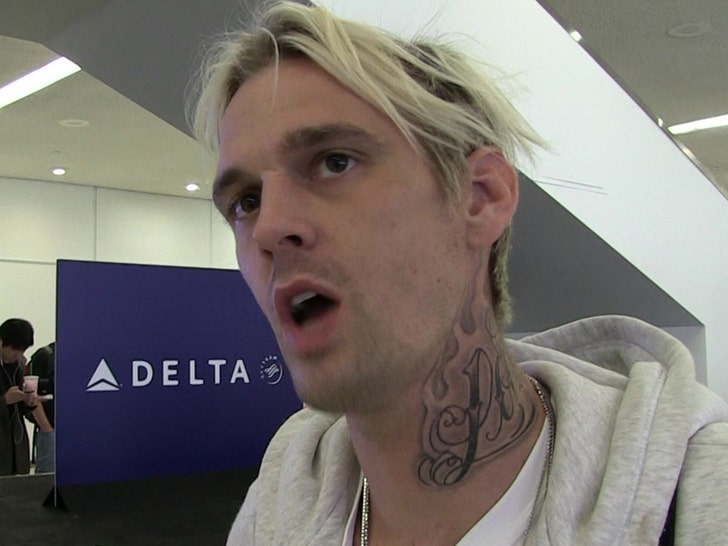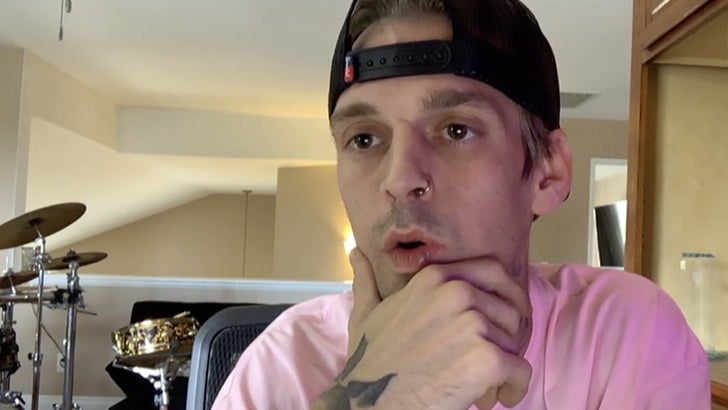In late April, Britney Spears delivered a plea to her 22 million Instagram followers.
“Don’t believe everything you read and hear,” she wrote in a caption.
“Your love and dedication is amazing,” she went on, “but what I need right now is a little bit of privacy to deal with all the hard things that life is throwing my way.”
It had been three weeks since the pop star had checked into a mental health facility and three months since she canceled her Las Vegas residency. A particularly skeptical contingent of her fans wasn’t buying the official reasons for these developments: that she went to the facility by choice, that her dad was sick and she needed the space and time to be there for her family. Theories of what was actually happening inside Spears’ guarded private life were growing more numerous and more frenzied, but ultimately shared one notion: that she was being silenced and manipulated, and had been for years.
Advertisement
Protesters gather outside the Stanley Mosk Courthouse in Los Angeles in May 2019 as a status hearing is held on the pop star’s conservatorship.
(Laura Newberry / Los Angeles Times)
The Los Angeles Times spent three months examining Spears’ conservatorship and reaching out to those who might have seen firsthand how it has affected her; no one in her inner circle responded to requests for comment. The paper could find no independent evidence that Spears was being harmed by the arrangement.
Spears is a celebrity like no other — an A-list performer who pulls in millions of dollars a year but does not have full control over her life or business affairs. Since her public unraveling in 2008, she has been subject to a court-approved conservatorship — known in other states as a legal guardianship — that gives her father authority over her finances and many personal decisions. Fans who believe the arrangement is intended to exploit rather than help her have adopted a hashtag and rallying cry: #FreeBritney.
The legal oversight is highly unusual. Conservatorships are designed to protect people who cannot take care of themselves, but Spears, now 37, has worked nonstop over the course of her own, producing four albums and going on as many world tours.
Advertisement
Despite Spears’ insistence on social media that she is fine and in control of her life, the #FreeBritney machine has developed in ways neither the superstar nor her team can control. It’s become a tabloid staple, a social media obsession. With fans often interpreting celebrities’ actions through a personal lens, Spears has become a vessel for discussing the place of women in entertainment, mental illness and father-daughter relationships.
Her attorney Stanton Stein, whom Jamie Spears had hired for #FreeBritney damage control, rejected the idea that Spears had been coerced or manipulated in any way. “She’s always involved in every career and business decision,” he said. “Period.”
Spears didn’t mince words in her April Instagram post. In that moment, she appeared determined to show that she does, in fact, have a say over her life.
“You may not know this about me,” she wrote, “but I am strong, and stand up for what I want!”

Britney Spears appears with her head shaved in 2007.
(KABC Television/AFP/Getty Images)
Why is Spears under a conservatorship?
They are images not easily forgotten: Spears driving with a baby in her lap. Shaving her head. Speaking in a British accent. Being wheeled out of her Beverly Hills mansion on a stretcher.
For many, it was alarming to see the vulnerability of someone who — when judged by the metrics of money and fame — had attained unfathomable status. Spears topped Forbes’ list of the world’s highest-paid celebrities in 2002 and again in 2012.
In 2008, she twice was committed to a psychiatric ward, known in California as a 5150 hold. After the second hold, her father, Jamie Spears, petitioned L.A. County Superior Court for an emergency “temporary conservatorship.” The arrangement was made permanent by the end of the year.
Advertisement
Jamie Spears was appointed to watch over his daughter’s estate and physical well-being, while L.A. attorney Andrew Wallet was brought on as a co-conservator to help manage the singer’s financial assets.

Jamie Spears leaves the Stanley Mosk Courthouse in 2012.
(Nick Ut / Associated Press)
Court documents show that Jamie Spears has the power to negotiate business opportunities, sell her property and restrict her visitors. He can file for restraining orders against those he believes threaten his daughter’s stability.
And he oversees much of the minutiae of Spears’ life. Every purchase she makes must be logged in annual court reports of her spending.
According to law experts, it is unusual for someone as young and productive as Spears to be in a probate conservatorship, typically used to protect the old, infirm and mentally disabled. They are intended for people who are not likely to get better and often remain in effect until the person dies.
But Spears is not a typical person. Her estate is immense and complicated to manage, so she could be subject to “undue influence“ — a factor judges consider, along with mental capacity, when deciding whether a conservatorship is a good fit.
“I imagine a person with that kind of wealth would be attracting a lot of people toward them, many of whom may not have their best interest in mind,” said psychologist Stacey Wood, an expert witness in probate conservatorship cases. “This could protect them from that.”
For example, in June Spears’ father sought to extend a restraining order against her former friend and manager Sam Lutfi, whom the family alleged had encouraged Spears down her destructive path and attempted to benefit from her fame. More recently, Lufti has been a vocal supporter of the #FreeBritney movement.
The next status hearing on her conservatorship is set for Wednesday.
Why the renewed interest?
While lacking full authority over her life, Spears for 10 years worked relentlessly, dropping albums every two to three years and landing lucrative gigs such as her stint as a judge on the TV show “The X Factor.” She played 248 shows for her “Piece of Me” residency in Las Vegas between 2013 and 2017, each performance banking her $500,000. No more public meltdowns, no more outlandish behavior.
Advertisement
Then in January 2019, Spears announced she was canceling her new Las Vegas residency, “Domination.” She pinned the decision on the health of her father, who nearly died after his colon ruptured in November 2018.
“We’re all so grateful that he came out of it alive, but he still has a long road ahead of him,” Spears wrote on Instagram. “I had to make the difficult decision to put my full focus and energy on my family at this time. I hope you all can understand.”
Britney Spears performs in Las Vegas.
(Chris Pizzello / Invision / Associated Press )
In the eyes of some fans, it was a sign that not all was well in Spears’ universe. Another came in March, when Wallet resigned as co-conservator.
In court filings, Wallet wrote that the “conservatorship is engaged in numerous ongoing business activities requiring immediate attention,” and that it would be in Spears’ best interest if his resignation were accepted swiftly. He did not provide a specific reason for his resignation.
The singer, Wallet said, would suffer “substantial detriment, irreparable harm and immediate danger” if he didn’t step down.
Wallet had been granted a significant raise in November — to $426,000 a year — after arguing he had brought “stability and leadership” to Spears’ estate, which under his guidance had grown by $20 million. He claimed to have kept “the many hundreds” of people working with her from giving her drugs, thereby preventing financial ruin.
Adam Streisand, a lawyer Spears spoke with when she considered contesting the conservatorship in 2008, told The Times that Wallet’s “noisy withdrawal” might signal a disagreement with Jamie Spears over how the arrangement was handled. Neither Wallet nor Spears returned calls seeking comment.

Adam Streisand outside the Stanley Mosk Courthouse in 2008.
(Toby Canham / Getty Images)
When Britney Spears checked into a mental health facility for a monthlong stay on April 3, her fans were on high alert.
L.A.-based comedians Tess Barker and Barbara Gray had long been tracking the conservatorship with great interest. They host “Britney’s Gram,” a podcast that usually dissected the singer’s Instagram posts. But after Spears canceled her residency, the hosts dropped their lighthearted tone.
In an “emergency episode” in mid-April, Barker and Gray asserted that Spears was being micromanaged by her handlers and held captive by the conservatorship.
What really gave #FreeBritney momentum, though, was a voicemail left on the podcast hotline.
In the message, a man identifying himself as a former paralegal for an attorney who worked with Spears’ conservatorship claimed that the singer’s father was involved in getting her to drop her Las Vegas residency. He also made a series of other allegations and raised concerns about her personal autonomy.
Britney Spears on “The X Factor.”
(Jason Merritt / Getty Images)
The podcasters said they confirmed the source’s identity and his alleged position at the firm. The Times could not independently verify that the voicemail was authenticor that the claims were true.
#FreeBritney was trending on Twitter the day after the podcast dropped. Fans stormed Spears’ social media accounts with the hashtag, demanding she be released from what they were convinced was a court-sanctioned prison.
It’s hard to assess the size of the movement. But #FreeBritney was enough of a problem for her camp that in June, Jamie Spears sued “Absolute Britney” blogger Anthony Elia, accusing him of spreading false and defamatory information in the name of the #FreeBritney movement.
“Enough is enough,” the complaint declared.
A week after the podcast was released, Spears attempted to reassure her fans through an Instagram post that all was well. She just needed some privacy, she said.
View this post on Instagram
A post shared by Britney Spears (@britneyspears) on
“There’s rumors, death threats to my family and my team, and just so many ... crazy things being said,” she wrote. “I am trying to take a moment for myself, but everything that’s happening is just making it harder for me. Don’t believe everything you read and hear.”
Some of her followers weren’t convinced. Miley Cyrus yelled “Free Britney!” during one of her concerts. Dozens rallied outside West Hollywood City Hall, carrying signs with slogans like “Britney Isn’t a Slave for You.”
On May 10, Spears and her parents attended a conservatorship status hearing in L.A. County Superior Court. The star usually didn’t show up for such meetings. Members of the public and media were cleared from the courtroom.
After the hearing, Judge Brenda A. Penny ordered an independent expert evaluation of the case.
A few days later, Spears’ manager, Larry Rudolph, said in an interview with TMZ that the singer would not perform in the near future, and “possibly never again.” He later clarified his statement, saying he was “not sure if or when she will ever want to work again.”
In May, Jamie Spears filed a petition to extend the conservatorship to Hawaii and Florida, where his daughter likes to vacation, and to her home state, Louisiana (he added nine more states to the request in August).
Experts chime in
In recent Instagram posts, Spears projects a happy and healthy existence: breakfast with her boyfriend, Disneyland with her sons, shopping at Bloomingdale’s. Neither she nor her family have clarified the state of her mental health struggles and diagnosis, or how she feels about the terms of her conservatorship.
To many, fans’ claims that one of the world’s most recognizable celebritiescould be taken advantage of in some way is both horrifying and tantalizing. Law experts point out that while conservatorships can be corrupted, as some Spears fans allege, there is probably good reason the constraints still stand.
“The fact that she’s been under conservatorship for a dozen years should tell you something about the state of her mental impairment and her vulnerability,” said Streisand, who specializes in high-profile wealth disputes. “The courts will do everything they can to ensure that a person is not conserved unless they really, really need to be.”
Before granting a probate conservatorship, the court must have reason to believe that the proposed conservatee is unable to manage their own affairs and needs to be protected. And there needs to be a recognizable cognitive impairment assessed by an impartial doctor.
In 2008, Spears may have been a danger to herself and her children, said Andy Mayoras, a probate attorney who has written about her conservatorship. Drastic action, he said, was necessary at the time.
“The question is, at what point is it appropriate to scale back the restrictions and let her try living her life without them?” Mayoras said.
A probate conservatorship is designed to continue until someone involved in the case — usually the person being conserved — asks for it to be lifted. When the judge ordered an expert evaluation of Spears’ conservatorship in May, it was unclear whether the singer or someone in her camp had requested it.
“It would suggest to me a consideration of change in status,” psychologist Wood said.
Spears at the 2011 Billboard Music Awards in Las Vegas.
(Getty Images)
For the conservatorship to be terminated, Spears would need to prove that she’s able to navigate life without one. Judges can sometimes be hesitant to dissolve such arrangements because it is hard to know if someone is truly well enough to take care of themselves, said Mary Thornton House, a retired L.A. County probate judge.
“There’s always the fear that someone could get financially, physically or emotionally hurt once it’s lifted,” she said.
One factor the court might consider is Spears’ ability to earn a living outside the conservatorship.
Former co-conservator Wallet called the arrangement a “hybrid business model” in his petition for a raise. What this could mean, in part, is that the conservatorship has enabled Spears to clinch business deals that might have been unavailable to her after her most turbulent years, Mayoras said. She might have been seen as too much of a risk otherwise.
A 2014 piece on Spears’ Las Vegas residency by veteran journalist Taffy Brodesser-Akner, published in the online magazine Matter, quoted a source at Caesars Entertainment as saying “the company had insisted on the conservatorship just in case, and that it must remain throughout her contract.”
In his role as conservator, Jamie Spears is paid $130,000 annually by his daughter’s estate. The star has had a historically strained relationship with her dad, fueling questions among fans about whether he should be overseeing the complex conservatorship on his own.
“I think it was wise to have Wallet there for checks and balances,” Thornton House said.
The relationship between Spears and her father made news again in August after Kevin Federline — the father of her two sons — filed a police report alleging Jamie Spears had abused one of his grandsons during a visit at his home. According to reports, he “violently shook” 13-year-old Sean after breaking down a bedroom door to reach him.
The boys were granted a restraining order against their grandfather.
Not long afterward, Jamie Spears requested that L.A. Superior Court allow him “to temporarily relinquish the powers of conservatorship of the person” because of health reasons, court records show. He asked that his daughter’s care manager of one year, Jodi Montgomery, adopt his duties.
Judge Penny granted the request on Sept. 9 and appointed Montgomery as temporary conservator.
According to pop culture researcher Marc Brennan, who as a professor has taught lessons on Spears for a class that tackled “celebrity as an industry,” the singer has a strong connection to her young fans, who are more inclined than in years past to examine what her situation says about our culture as a whole.
“It’s an interesting case study,” Brennan said. “Here we have a 37-year-old woman strong enough to be in the public eye and perform, but is supposedly not strong enough to look after her own children and her money.”
In the 2008 MTV documentary “For the Record,” Spears spoke candidly of her life in the spotlight. “Even when you go to jail there’s always the time that you know you’re going to get out,” she said.
The interviewer asked if she felt out of control.
“I think it’s too in control,” she replied. “There’s no excitement, there’s no passion. It’s just like Groundhog Day every day.”
https://www.latimes.com/local/lanow/la-me-ln-britney-spears-conservatorship-20190625-story.html
2019-09-18 11:00:00Z
CAIiEAHK24zzHT-T8HJd5MHytJ0qFwgEKg4IACoGCAowjKxcMOvhCzCU9KQB







